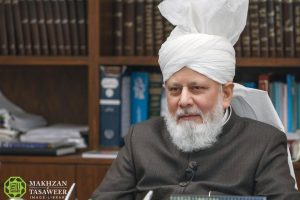
His Holiness, Hazrat Mirza Masroor Ahmad (aba) is a beaming beacon of Divine guidance and support. His Holiness (aba) represents the highest level of a connection with God in today’s world and thus he is the spiritual leader for tens of millions across the world, and champions the message of fulfilling the rights owed to God, and fulfilling the duties we each owe to our fellow human beings. Over the course of his Friday Sermons, addresses on various occasions, meetings with different organizations and children’s classes, His Holiness (aba) imparts invaluable knowledge and insight on a remarkably vast array of topics.
The Review of Religions is honoured to present some of these ‘Rays of Wisdom’ from His Holiness (aba) taken from various sources, for the benefit of its readers.
Contents
Was the Holy Prophet (sa) Sent for Other Worlds Beyond this Earth As Well?
How Do I Know if I Have Good Friends?
How Can We Express Our Faith in Modern Times?
Was the Holy Prophet (sa) Sent for Other Worlds Beyond this Earth As Well?

With the ever-increasing developments in technology and the broadening horizons of space exploration in efforts of finding life outside of this earth, some think it is only a matter of time before we establish communication with extra-terrestrial life. It is perhaps one of the greatest unknowns, and only time will tell whether this concept becomes a reality. However, the very possibility brings up an interesting thought. In the Holy Qur’an, the Holy Prophet Muhammad (sa) has been called ‘a mercy for all peoples’. [1] As such, Muslims believe that the Holy Prophet (sa) brought the universal teaching of Islam for all peoples. If communication with extra-terrestrial life is eventually established, does this mean that the message and teachings brought by the Holy Prophet (sa) also apply to them? This question was posed to His Holiness (aba) on one occasion.
His Holiness (aba) replied:
‘Of course, the Holy Prophet (sa) is a mercy for all peoples (‘Alameen), and there is no limit to ‘Alameen for him, wherever it may be. There are other prophets in relation to whom the word ‘Alameen has been used, but the scope of ‘Alameen for them was limited to where they were sent. However, the Holy Prophet (sa) was sent for the entire world; and when this world establishes contact with another world where there is life which possesses knowledge and understanding, and [the concept of] religion reaches them, then of course, the Holy Prophet (sa) will be a prophet for them as well. Allah the Almighty commissioned the Holy Prophet (sa) for all such places where his message can be conveyed, because by calling Himself the ‘Lord of All the Worlds’, and then by calling the Holy Prophet (sa) ‘a mercy for all people’ in the Holy Qur’an, God has broadened the scope of ‘Alameen for the Holy Prophet (sa). The scope of ‘Alameen for the Holy Prophet (sa) extends to wherever his message reaches. At that time, they will have to accept [this message]. At present, you should convey the message of the Holy Prophet (sa) to this world and that in itself would be a great feat…Begin with your own dwelling, then Allah the Almighty will take care of the rest, and God-willing, when communication with other worlds is established, He will also convey the message there as well.’ [2]
How Do I Know if I Have Good Friends?

One of the most important bonds which we experience is friendship. These bonds develop over time, with people we meet at school, work or anywhere else, and become a means of support, happiness and companionship. It’s important to have positive influences around us, but it’s equally important to determine whether someone truly is a good friend to us, as Islam stresses the importance of keeping good company. On one occasion, a young girl asked His Holiness (aba) how we can know whether someone is a good friend to us or not.
His Holiness (aba) replied,
‘Allah the Almighty has given you wisdom; Allah the Almighty says you use that. You can judge between bad and good. Can you judge what is bad and what is good? Can you judge what is rotten food and what is good food?…If you can judge, then you should know that who is your good friend. By interacting with your friends, you would know how does your friend talk; if they are talking in a way which is appropriate, which is according to the norms of the morals, then she is your good friend. If they talk in an inappropriate way, their morals are not good, their company is not good, they are mixing too much with boys, they talk too much about so many worldly things, then that means they are not your good friends. And, if you are in need of something, they help you, they are sincere with you, then they are your good friends. There are so many other factors by which you can judge who is good and who is bad.’ [3]
How Can We Express Our Faith in Modern Times?

In this day and age, some people look down upon religion and consider it secondary to worldly pursuits. Furthermore, amidst the influences of the modern world, those who are religious may find it difficult at times to express their faith. Once, someone asked His Holiness (aba), ‘how can we stay true to our faith whilst others may have worldly beliefs, and one is afraid to express his or her own ideas due to the fear of being classified as rude or backward?’
His Holiness (aba) replied,
‘First thing is that you remove your inferiority complex. If you believe, and if you think that your religion is true religion, and it is the last of the religions, and it is the final religion, and it contains all the good teachings which were revealed to previous prophets, then there should not be any complex. Secondly, those people who are worldly people, who do not want to listen to you with regards to religious matters, why force them to listen to you. Find some good friends, talk to them in a light mood, and when you think that they are ready to listen about God, about religion, about faith, then you can talk to them, that what is the true teachings of Islam. And never say just outrightly that Islam is the supreme religion and it’s better than any other religion. Although we can prove the supremacy of Islam on all other religions, but no need to get other people annoyed by saying this thing directly. When they come to listen to you, they talk to you about religion, then you can show them some proofs; what is religion, what is God, what do you believe, what is your belief with regards to Allah the Almighty, and what are your other beliefs with regards to prophets. And there are quite a number of other commandments, if you read in the Holy Qur’an then you would know. Then, slowly, with wisdom, and with amicable discussion, you can tell them. Then they will listen to you, otherwise, if you are just blunt, they will obviously say you are rude and backward. Don’t try to be blunt, be wise.’ [4]
Discovering the ‘Right Path’

When trying to achieve any purpose, doing the right thing, adopting the right methods and treading on the right path towards success is of vital importance. For Muslims, a primary aspect of faith is offering the five daily prayers, and one of the most integral parts of these prayers is reciting the opening chapter of the Holy Qur’an, Surah al-Fatihah. This chapter contains a prayer, asking God to be led in the right path. As such, Muslims frequently recite this prayer throughout the course of day, in hopes of achieving God’s nearness and pleasure. Once, while explaining the philosophy of discovering the right path, His Holiness (aba) said:
‘In Surah al-Fatihah [opening chapter of the Holy Qur’an], Allah the Almighty has taught us the following prayer:
اِهْدِنَا الصِّرَاطَ الْمُسْتَقِيْمَ
‘Guide us in the right path.‘
The meaning of this supplication is extensive. While elaborating upon this, the Promised Messiah (as) states that when a farmer learns the traits and skills required for farming, it is at that point that he becomes skilled in the practice of farming, meaning that when a farmer learns the knowledge about farming in that he knows how to plough, sow the seeds, when to fertilize the land, when to irrigate it, when to spray the fields, it is then that one can say that they are on the right path of their profession. In the same way, one should seek the right path to meet with God and pray: “O my Lord! I am your sinful and humble servant. Please guide me!” Supplicate to God for all your needs, regardless of how insignificant they may be, for He is the One Who Bestows. The most righteous is the one who prays the most, because if a beggar knocks at the door of a miserly person, he will one day feel ashamed and give something to the beggar. Therefore, one who begs in front of God Almighty, Whose generosity is matchless, how can he not receive from Him? Hence, the one who asks, eventually receives.’ [5]
ENDNOTES
[1] The Holy Qur’an 21:108
[2] Meeting with Ansarullah Switzerland – 19 June 2021
[3] Meeting with Nasirat UK – 26 June 2021
[4] Ibid
[5] Friday Sermon – 25 October 2019



Add Comment